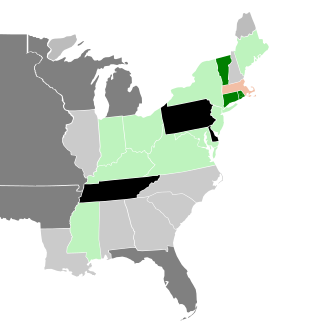Related Research Articles

The 1822–23 United States House of Representatives elections were held on various dates in various states between July 1, 1822, and August 14, 1823. Each state set its own date for its elections to the House of Representatives before the first session of the 18th United States Congress convened on December 1, 1823. They occurred during President James Monroe's second term.
The 1820–21 United States House of Representatives elections were held on various dates in various states between July 3, 1820, and August 10, 1821. Each state set its own date for its elections to the House of Representatives before the first session of the 17th United States Congress convened on December 3, 1821. They coincided with President James Monroe winning reelection unopposed.

The 1820–21 United States Senate elections were held on various dates in various states, corresponding with James Monroe's landslide re-election. As these U.S. Senate elections were prior to the ratification of the Seventeenth Amendment in 1913, senators were chosen by state legislatures. Senators were elected over a wide range of time throughout 1820 and 1821, and a seat may have been filled months late or remained vacant due to legislative deadlock. In these elections, terms were up for the senators in Class 1.

Pennsylvania gained three seats in reapportionment following the 1820 United States census. Pennsylvania elected its members October 8, 1822.

Pennsylvania elected its members October 10, 1820.

Kentucky elected its members August 7, 1820.
This was the first election in Massachusetts after the separation of the former District of Maine as the new State of Maine, taking the old 14th – 20th districts with it.

New Jersey elected its members November 7, 1820. There were an unusually large number of candidates, 119 candidates according to one contemporary newspaper. Some candidates ran under an "Anti-Caucus" ticket. Only 1 of the 6 six incumbents would serve in the next term, as 4 retired and 1 died after re-election.

Ohio elected its members October 10, 1820.

On December 20, 1820, Jesse Slocumb (DR) of North Carolina's 4th district died. A special election was held to fill the resulting vacancy

On May 15, 1820, David Fullerton (DR) of Pennsylvania's 5th district resigned from his seat in the House of Representatives. A special election was held on October 10, 1820, to fill the resulting vacancy. This election was held on the same day as the election for the 17th Congress.

On February 1, 1820, James Johnson (DR) of Virginia's 20th district resigned from his position as Representative. A special election was held to fill the resulting vacancy

On July 6, 1820, James Pindall (F) resigned from his position as Representative for Virginia's 1st district. A special election was held to fill the resulting vacancy.

On February 10, 1820, George F. Strother (DR), Representative for Virginia's 10th district, resigned, having been appointed as receiver of public money in St. Louis, Missouri. A special election was held to fill the resulting vacancy
A special election was held in Massachusetts's 1st congressional district on October 23, 1820, to fill a vacancy created by the resignation of Jonathan Mason (F) on May 15, 1820. As a majority was not achieved on the first ballot, a second ballot was held November 6, 1820
A special election was held in Massachusetts's 8th congressional district on October 16, 1820, and November 24, 1820, to fill a vacancy caused by the resignation of Zabdiel Sampson (DR) on July 26, 1820.

Virginia elected its members in April 1821, after the term began but before the new Congress convened.

The 1820 United States elections elected the members of the 17th United States Congress. The election took place during Era of Good Feelings and the First Party System. Despite the Panic of 1819, the Democratic-Republican Party maintained control of the presidency and both houses of Congress, while the Federalist Party provided only limited opposition. Missouri joined the union during the 17th Congress.
The 1822 United States elections occurred in the middle of Democratic-Republican President James Monroe's second term, and was the last election of the First Party System. Members of the 18th United States Congress were chosen in this election. The 1820 census added 26 seats to the House. Democratic-Republicans continued to dominate both chambers of Congress.

The 1820 Delaware gubernatorial special election was held on October 3, 1820. The winner of the 1819 gubernatorial election, Henry Molleston, died before assuming office, elevating State Senate Speaker Jacob Stout to the governorship and triggering an election in 1820. However, the election was not just for the remainder of Molleston's term, but instead for a full three-year term.
References
- 1 2 16th Congress membership roster Archived 2013-03-09 at the Wayback Machine
- ↑ Election details